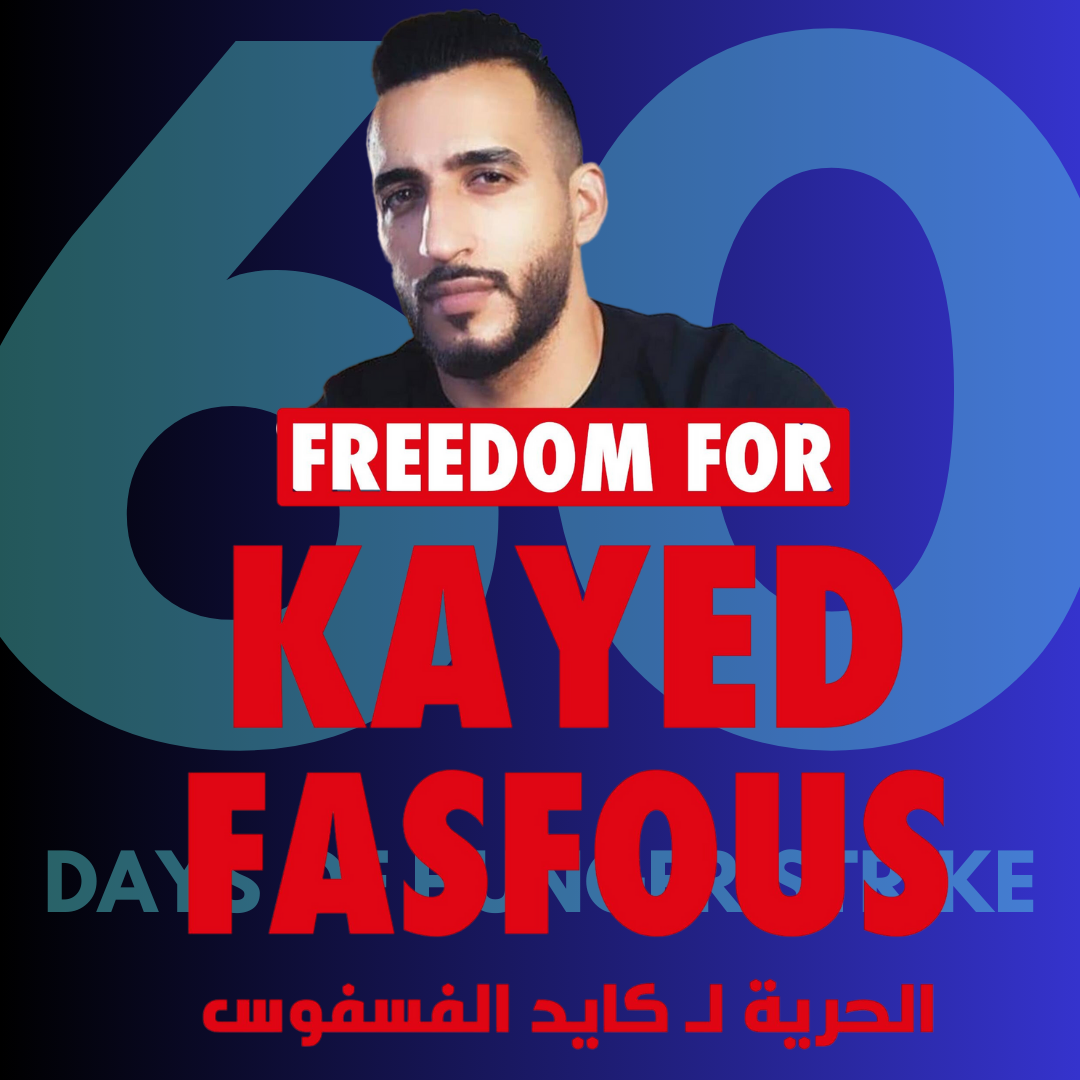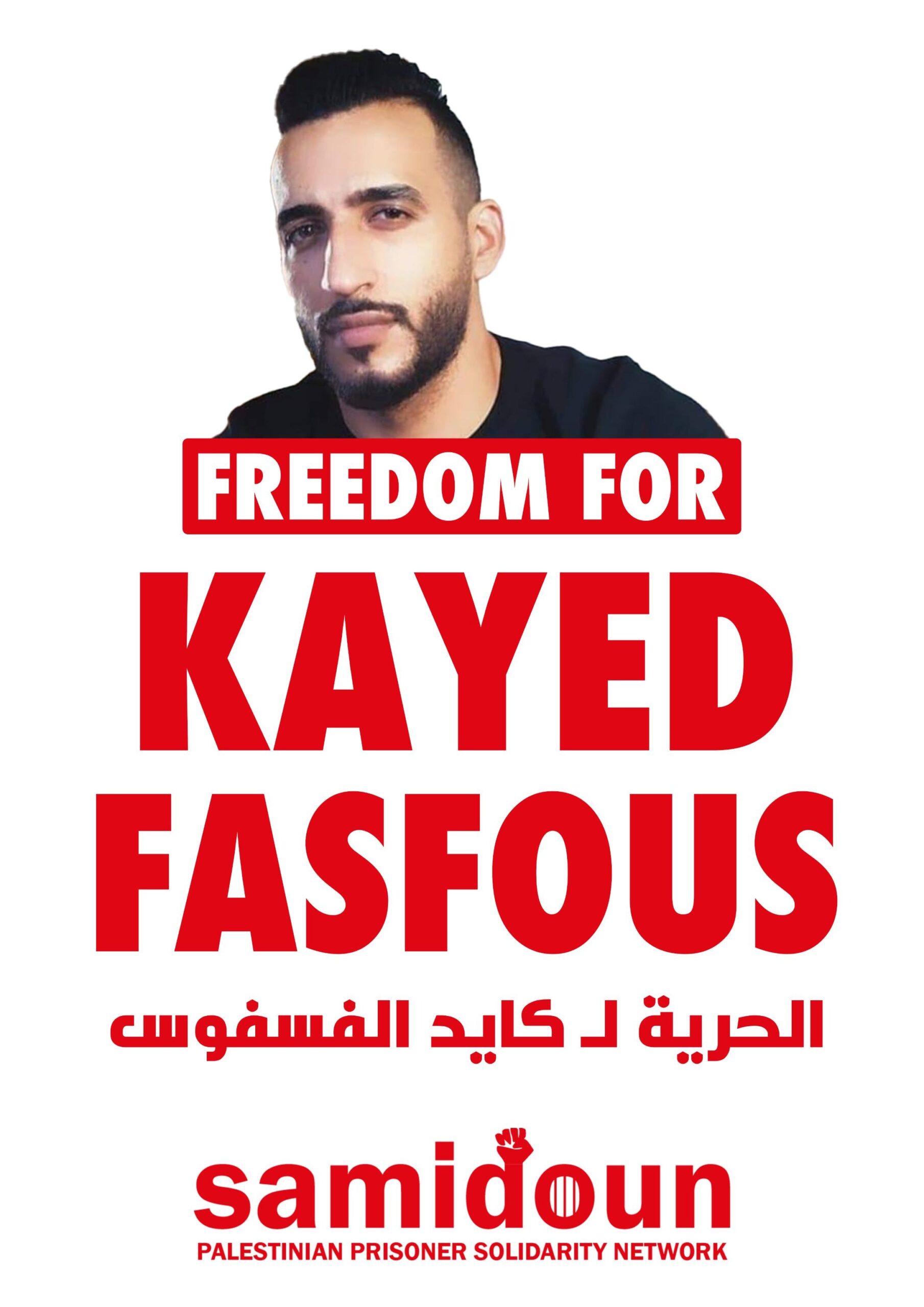
Palestinian political prisoner Kayed Fasfous is on his 60th day of hunger strike in occupation prisons against his administrative detention, imprisonment without charge or trial. Fasfous, 34, entered his third month of hunger strike on 1 October 2023. On Monday, 2 October, an Israeli occupation military court is scheduled to hear another appeal by Fasfous against his arbitrary imprisonment.
Fasfous, from the town of Dura, near al-Khalil, is married and the father of a daughter, Jawan. He previously won his freedom from administrative detention in 2021 in a 131-day hunger strike that caught the attention of the world, especially after he was moved to a civilian hospital and received visits from journalists and his family, who took pictures and videos illustrating his emaciated state. (Prior to his imprisonment, Fasfous was a bodybuilder.)
Fasfous’ health has deteriorated significantly in the last weeks of his strike, and he was transferred to the Ramle prison clinic; he has repeatedly been denied transfer to a civilian hospital, where he could be seen and his case publicized outside the confines of the colonial prison system. Since he began his hunger strike, Fasfous has been subjected to systematic mechanisms of coercion and repression amounting to torture, including being isolated in harsh conditions in Al-Naqab prison, repeatedly abused through searches of his cell, being deprived of a mattress for a long period of time. He was then transferred to isolation in Ashkelon prison and now to the infamous Ramle prison clinic, referred to as a slaughterhouse by Palestinian prisoners.
While Fasfous is appealing his administrative detention through the occupation courts, it is clear that the occupation courts are not a mechanism of justice but part and parcel of the system of colonial imprisonment. The military courts rubber stamp the orders of the Shin Bet, the Israeli intelligence agency, at the expense of Palestinians jailed by the occupation. Palestinian prisoners have been working for years to institute a comprehensive boycott of the occupation courts and expose the fig leaf of pseudo-legality being imposed on arbitrary mass imprisonment.
On Thursday, 28 September, administrative detainees in the Naqab desert prison collectively returned their meals in solidarity with Fasfous, calling for his release and the end of his detention.
A former prisoner, Fasfous has spent around 7 years in total in occupation prisons since his first arrest in 2007. He was re-arrested by occupation forces on 2 May 2023 and ordered to administrative detention once again, alongside four of his brothers: Khaled, Akram, Hafez and Hassan. Hassan was released during Kayed’s strike, but four of the Fasfous brothers remain detained, imprisoned without charge or trial.
They are among 1319 Palestinians jailed without charge or trial under administrative detention, a number that has skyrocketed in the past year, out of 5,200 Palestinian political prisoners in occupation jails. This number includes 20 children and four women. Administrative detention was first introduced to Palestine by the British colonial mandate and was adopted by the Zionist regime. Palestinians are routinely jailed for years at a time under repeatedly renewed detention orders issued for up to six months at a time. In the past year, the number of administrative detainees has more than doubled as part of the ongoing “war” on the prisoners’ movement.
Samidoun Palestinian Prisoner Solidarity Network urges all supporters of Palestine to take action to support Kayed Fasfous and all Palestinian prisoners struggling for freedom, for their own lives and for the Palestinian people. These sons of the Palestinian popular masses are confronting the system of Israeli oppression on the front lines behind bars, with their bodies and their lives, to bring the system of administrative detention to an end.
It is particularly important to stand with the strikers and not let their cases be silenced — earlier this year, on 2 May, Sheikh Khader Adnan’s life was taken after 86 days of hunger strike while being actively denied medical care. He had previously won his freedom four times through hunger strikes. These Palestinian prisoners are putting their bodies, health and lives on the line for liberation.
With over 1200 Palestinians jailed without charge or trial — over 20% of all Palestinian prisoners — the struggle to bring down administrative detention is more urgent than ever. Take these actions below to stand with the hunger strikers and the struggle for liberation of Palestine, from the river to the sea!
Download these signs for use in your campaigns:

- Poster/Sign: End Administrative Detention
- Poster/Sign: Freedom for Kayed Fasfous
- Poster/Sign: Free Hunger Strikers and All Prisoners
- Poster/Sign – End Administrative Detention (with Palestinian Flag)

Discover more from Samidoun: Palestinian Prisoner Solidarity Network
Subscribe to get the latest posts sent to your email.




